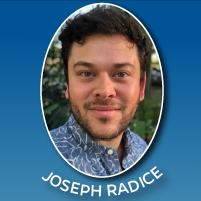Learn more about the Graham Center Doctoral Dissertation Fellowship
Four Ph.D. candidates from the University of Florida College of Liberal Arts and Sciences have been selected as Fall 2021 doctoral dissertation fellows at the Bob Graham Center for Public Service.
The selected fellows are Megan Cogburn, Joseph Radice, David Meltsner and Alyssa Dewees. They are each in the final semester of their graduate research and will receive a $9,000 stipend to support the completion of their dissertation on a topic germane to Graham Center programming.
Megan Cogburn
 For more than a decade, Megan Cogburn has been involved in immersive research to examine access to maternal health care for women in rural communities in Tanzania.
For more than a decade, Megan Cogburn has been involved in immersive research to examine access to maternal health care for women in rural communities in Tanzania.
“Childbirth and reproduction are some of the most pressing public and political issues globally, and it is a domain where many health workers devote their lives in public service,” Cogburn said.
Like many of its sub-Saharan neighbors, Tanzania has deemed homebirths illegal and now requires expectant mothers to give birth in public health clinics and hospitals. The intent is to raise maternal health indicators, often to a level that satisfies international development goals.
“Boosting the percentage of women who give birth in health facilities is key to health governance. However, progress in some remote areas has been slow,” Cogburn said.
“Hospitals may deliver babies, but they do not always deliver the care they promise,” she said.
She hopes her research results will address the causes of the slow progress and offer sustainable public policy solutions for how to better care for pregnant women and mothers, as well as the nurses who dedicate their lives to public service yet are often overlooked in global policy debates.
Cogburn is a native of Venice, Florida, and graduated summa cum laude from Wheaton College in 2010 with a B.A. degree in anthropology. She has been volunteering, working and conducting health-related research in Tanzania supported by the Foreign Language and Areas Studies fellowship in Swahili; a research fellowship with the Transparency for Development Project, jointly-run through the University of Washington, Harvard Ash Center and the global nonprofit Results for Development; the University of Florida International Center and the Fulbright-Hays Program; and the CLAS Dissertation Fellowship.
Her publications include Homebirth fines and health cards in rural Tanzania: on the push for numbers in maternal health and The silencing of political context in health research in Ethiopia: why it should be a concern.
David Meltsner
 David Meltsner’s research integrates disciplines such as political science, legal studies, sociology and criminology to examine the origins of the school-to-prison-pipeline — the combination of institutional factors that have converged to push primarily Black and Latino students out of school and into the criminal justice system.
David Meltsner’s research integrates disciplines such as political science, legal studies, sociology and criminology to examine the origins of the school-to-prison-pipeline — the combination of institutional factors that have converged to push primarily Black and Latino students out of school and into the criminal justice system.
His particular area of focus is New York City from 1968 to 1980, when public schools decentralized and accelerated integration programs. According to Meltsner, a range of local entities including teachers, principals, parent associations, law enforcement officers and even school architects collectively shaped narratives on youth violence and juvenile delinquency that have harmed generations of public school students.
“As recently as 2011, New York City public schools suspended 70,000 students,” Meltsner said.
“Black students accounted for half of these suspensions even though they represented less than one-third of the city’s public school population.”
His work will provide a blueprint for how policymakers can assemble the relevant stakeholders to dismantle the interlocking systems that continue to coalesce and remove at-risk children from school.
Meltsner is a native of Bay Shore, New York, and received a B.A. in history from Binghamton University. He taught English in Mississippi for three years, and then began his Ph.D. studies at the University of Florida.
His master’s thesis explored the struggle for voting rights in the Jim Crow South. Upon advancing to Ph.D. candidacy, Meltsner has earned the Tedder Family Dissertation Fellowship, the Bertram Wyatt-Brown Dissertation Research Award, the Daniel J. Koelos Award and the Imagining America travel award. He serves on the editorial board of Alpata: A Journal of History and is a frequent contributor of op-eds to The Gainesville Sun about issues related to mass incarceration, racial justice, and human rights.
Joseph Radice
 Joseph Radice’s research examines how written and spoken language can be used to uplift LGBTQ+ and other marginalized communities, and shape the world in a more positive manner.
Joseph Radice’s research examines how written and spoken language can be used to uplift LGBTQ+ and other marginalized communities, and shape the world in a more positive manner.
Using the study of linguistics, Radice is aiming to move beyond the usual focus on the consequences of hate speech to better understand how the concept of allyship can achieve the opposite — positively influencing the lives of LGBTQ+ individuals.
“Despite considerable progress during the past few decades, LGBTQ+ people remain an ostracized minority in our society,” Radice said.
“Research into queer lives and experiences has focused largely on anti-LGBTQ+ hate speech and its repercussions,” he said. “Allyship, especially as it manifests in real-world action, is a phenomenon that can change and even save lives.”
Radice hopes that his research can inform policymakers and provide a toolkit for public leaders as they shape civic engagement and mobilize populations for the benefit of marginalized populations in local communities.
“The motivation driving this project is the growing dissatisfaction with the status quo regarding the treatment of LGBTQ+ individuals in U.S. society at large,” he said. “My dissertation examines advocacy to offer a more profound understanding of the transformative potential of modern allyship.”
Radice is a native of Homestead, Florida. He earned a dual undergraduate degree in 2012 from UF in psychology and linguistics, with minors in business administration and teaching English as a second language, then taught English in Italy and Spain before returning to UF to complete a master’s in international business in 2016.
Since 2016, Radice has been awarded a FLAS Fellowship in Italian, an O. Ruth McQuown Scholarship, and a Charles T. Woods student grant.
He is the managing editor of the Journal of Public Interest Communications.
Alyssa Dewees
 Through her research into shifting representations of race and gender in the American South, Alyssa Dewees hopes to address larger societal issues of racial prejudice, domestic violence, gender inequality, poverty and drug addiction.
Through her research into shifting representations of race and gender in the American South, Alyssa Dewees hopes to address larger societal issues of racial prejudice, domestic violence, gender inequality, poverty and drug addiction.
“I study southern nostalgia in general,” Dewees said. “However, my dissertation is about Southern white nostalgia — the nostalgia for the ‘good old days’ of the Old South that prompts people to display Confederate flags or give long speeches about Antebellum days.”
Her research examines how today’s more inclusive narratives of Southern belonging contrast with older narratives of the South, and the implications that has for how people think about race and gender. She has analyzed texts from a variety of popular culture sources associated with the South, including literature, country music videos and visual media, as well as more non-traditional sources, such as ghost stories, historic home tours and antebellum reenactments.
“The nostalgia can be overt, like displaying a Confederate flag, or it can be more subtle and complex, like the nostalgia found in country music,” Dewees said.
“Understanding how white group identity is built and maintained can help us to understand how racism is perpetuated socially and built into public policy.”
Dewees is a native of Columbia, Illinois, a rural town outside of and across the river from St. Louis.
She obtained a bachelor’s degree in English and Spanish literature from Southern Illinois University Edwardsville in 2013, and her master’s degree there in English literature in 2015.
She taught for two years at SIUE before joining the graduate student teaching staff at the University of Florida. She was the recipient of a graduate student teaching award in 2019 recognizing an exemplary teaching record. Her writing has been published in The Journal of Feminist Scholarship and Synoptique.
Learn more about the Graham Center Doctoral Dissertation Fellowship